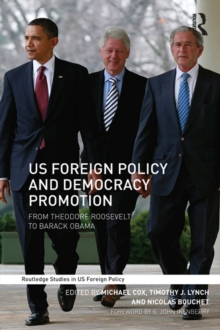
Constructing America's Freedom Agenda for the Middle East : Democracy or Domination PDF
by Oz Hassan
Part of the Routledge Studies in US Foreign Policy series
Description
This book explores how George W. Bush's Freedom Agenda for the Middle East and North Africa was conceived and implemented as an American national interest, from the Bush era right through to the initial stages of the Obama administration. It highlights how the crisis presented by September 11 2001 led to regime change in Afghanistan and Iraq, but more broadly how American policy towards the region had a softer imperial side, which drew on broader economic theories of democratisation and modernisation. The Freedom Agenda contained within it a prescribed method of combating terrorism, but also a method of engaging with and reforming the entire Middle East region more broadly, with many institutions seeking to use the opportunity to implement neo-liberal market logics in the region. Constructing America's Freedom Agenda for the Middle East highlights the particular understanding of "freedom" that underpins America's imperial project in the region; a project trapped between a policy of democratisation and domination. This book analyses the Freedom Agenda in significantly more depth than in available current literature and would be of interest to students and researchers of global politics and international foreign policy of recent years.
Information
-
Download - Immediately Available
- Format:PDF
- Pages:248 pages
- Publisher:Taylor & Francis
- Publication Date:12/11/2012
- Category:
- ISBN:9781136240454
Other Formats
- EPUB from £44.99
- Hardback from £145.00
- Paperback / softback from £46.35
Information
-
Download - Immediately Available
- Format:PDF
- Pages:248 pages
- Publisher:Taylor & Francis
- Publication Date:12/11/2012
- Category:
- ISBN:9781136240454










